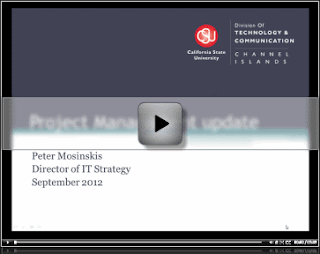(Update 2012-10-01: the CashNet EMarket Service is now available. Read more...)
The ability to take payments online for campus events, goods and services has been a difficult issue for the campus over the last 10 years. Interim solutions, such as PayPal and RegOnline, have been useful for addressing the immediate need, but have failed to provide a standard, cost-effective platform for online payment that matches both growing campus need and requirements to integrate with key campus systems.
Since April of this year, T&C has been working closely with team members from Budget and Fiscal Services and Student Financial Services to develop and roll-out a new system for online payment.
The new system is called CashNet eMarket, and provides online payment functionality that has been requested by campus organizations. The eMarket system will replace existing campus PayPal accounts for taking online payment for events, products and services.
So far, eMarket has been deployed for 2 systems: online purchase of parking permits, and for registration for the upcoming SCCUR conference.
In conjunction with Budget and Fiscal Services, T&C is pleased to announce that eMarket will become available this fall for campus entities and organizations that wish to take payment for events, goods and services online.
As of October 1, 2012, requests for new eMarket sites can be submitted by campus organizations to Budget & Fiscal Services. A full description of the process and a request form will be posted to the CI eMarket web site (details forthcoming). It is expected that implementation for most basic eMarket sites will take 4-6 weeks per site; eMarket sites which require integration with other campus systems may take longer.
October 1, 2012 will also be the last day to request new PayPal online payment sites through Student Business Services.
Over the course of the fall 2012 semester, Budget & Fiscal Services will work with programs and organizations that are using PayPal to migrate them to eMarket, with the goal of completing migration and conversion of all existing PayPal payment sites to eMarket sites by December 31, 2012.
Please contact Melissa Bergem, Project Coordinator at melissa.bergem@csuci.edu with any questions about CashNet eMarket or the roll-out of this important new service.

